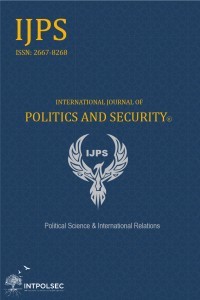Analyzing Antagonism in the Election of the Philippines Using Agonistic Democracy Paradigm
Agonistic, Antagonism, Divide, Election, Political Color
Analyzing Antagonism in the Election of the Philippines Using Agonistic Democracy Paradigm
Agonistic, Antagonism, Divide, Election, Political Color,
___
- Agoncillo, Teodoro. History of the Filipino People. 903 Quezon Boulevard, Quezon City: R.P. GARCIA Publishing Co.,
- Anderson, Benedict. Cacique Democracy in the Philippines: Origins and Dreams. Routledge, 1998.
- Aquino, Ranhilio. War of Classes. February 16, 2022. https://www.manilatimes.net/2022/02/16/opinion/columns/war-of-the-classes/1833135?fbclid= IwAR0yFHS3np-VtUQbF-NTcbnX2m8fsN_t7JRfNZwMRMSSD7Sb78VGbz1UTbI.
- Arambala, Gerry. “Radical Leadership in Post-Parojinog Ozamis Politics.” European Journal of Research, no. 11-12, (November 2018):82.
- Cupin, Bea. In vote-rich Quezon City, Uniteam promises a ‘New Society’ but still no concrete plans. February 15, 2022. https://www.rappler.com/nation/elections/uniteam-bets-promise-new-society-without-concrete-plans-rally-quezon-city/.
- Friedrich Naumann Foundation for Freedom, “Leni Robredo: The Last Man Standing is a Woman,” Friedrich Naumann Foundation for Freedom, April 19, 2020. https://www.freiheit.org/leni-robredo-last-man-standing-woman.
- Gomes, Robin. Philippine Election: Bishops urge voters to keep at heart the common good. March 28, 2022. https://www.vaticannews.va/en/church/news/2022-03/philippines-bishops-pastoral-letter-election-2022-common-good.html.
- Gregorio, Xave. Over 1200 Catholic clergy endorse Robredo- Pangilinan in ‘the battle for truth. May 4, 2022. https://www.philstar.com/headlines/2022/05/04/2178710/over-1200-catholic-clergy-endorse-robredo-pangilinan-battle-truth.
- Hutchcroft, Paul D., and Joel Racamora. “Strong Demands and Weak Institutions: The Origins and Evolution of the Democratic Deficit in the Philippines.” Journal of East Asian Studies 3, no. 2 (MAY-AUGUST 2003): 259-292.
- Hutchcroft, Paul. Linking Capital and Countryside: Patronage and Clientelism in Japan, Thailand, and the Philippines.’ Johns Hopkins University Press, 2014.
- Kusaka, Wataru. Moral Politics in the Philippines. Quezon City: Ateneo de Manila University Press, 2017.
- Maboloc, Christopher Ryan. “Philippine Democracy and Political Reform,” Active Democratic Leadership: Civil Society Empowerment in the Bangsamoro (2017).
- Mateo, Janvic. Robredo, Kiko top university mock polls. April 4, 2022. https://www.philstar.com/headlines/2022/04/04/2172114/robredo-kiko-top-university-mock-polls.
- Mouffe, Chantal. Deliberative Democracy or Agonistic Pluralism. Austria: Institute for Advanced Studies, Vienna, 2000.
- Mouffe, Chantal. Democratic Paradox. London: Verso, 2000.
- Mouffe, Chantal. The Return of the Political. New York: Verso, 1993.
- Owen, Norman G. "The Principalia in Philippine History: Kabikolan, 1790-1898." Philippine Studies 22, no. 3-4 (1974): 302.
- Padillo, Maya. EDSA failed, a Marcos is back: AdDU Prof. May 12, 2022. https://edgedavao.net/latest-news/2022/05/12/edsa-failed-a-marcos-is-back-addu-prof/?fbclid=IwAR0O2kKIicWl7b9K63Ba6ogqvNewY4JZ9PC0_jsFtNGzENs0eSZPXmDAwi4.
- Political observers downplay Iglesia ni Cristo’s endorsement of Marcos’ candidacy,” LiCAS.news Light for the Voiceless, May 6, 2022. https://www.licas.news/2022/05/06/political-observers-downplay-iglesia-ni-cristos-endorsement-of-marcos-candidacy/.
- Quimpo, Nathan Gilbert. “Review: Oligarchic Patrimonialism, Bossism, Electoral Clientelism, and Contested Democracy in the Philippines,” Comparative Politics 37, No.2 (January 2005): 229-250.
- Ramos, Marlon. Ping Lacson’s party Reporma shifts support to Leni Robredo. March 25, 2022. https://newsinfo.inquirer.net/1573385/pings-party-reporma-shifts-support-to-leni.
- Scott, James “Patron-Client Politics and Political Change in Southeast Asia.” Apsa 66, no. 1 (March 1972), 93. http://www.jstor.org/stable/1959280.
- Sidel, John T. Capital, Coercion, and Crime. Bossism in the Philippines. California: Stanford University Press, 1999.
- Sobritchea, Carolyn, I. “The Philippine Peasantry of the Early Colonial Period.” Philippine Sociological Review, 29 (1981): 17 – 23.
- Teehankee, Julio C. "Dissecting Patronage Democracy in the Philippines." In Patronage Democracy in the Philippines, edited by Julio C. Teehankee and Cleo Anne A. Calimbahan, 8. Quezon City: BUGHAW.2022.
- ISSN: 2667-8268
- Yayın Aralığı: Yılda 2 Sayı
- Başlangıç: 2019
- Yayıncı: Fikret BİRDİŞLİ
Rusya-Ukrayna Savaşına Giden Süreç: “Avrasyacılık” Anlayışı Çerçevesinden Bir İnceleme
Bölgesel Güven(siz)likten Küresel Güven(siz)liğe Doğu Akdeniz Sorunu
Mehmet Emin GÜVEN, Fatih TEKİN
A Mutual-Grand Strategy Modeling of the Russia-Ukraine War 2022: Balancing the Unbalanced
Defining Environmental Security as a National Security Issue
Analyzing Antagonism in the Election of the Philippines Using Agonistic Democracy Paradigm
